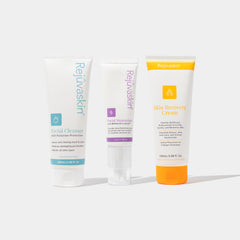Eczema can be frustrating, with its unpredictable flare-ups and constant itchiness. While topical treatments like Rejuvaskin’s Skin Recovery Cream offer relief, your diet may also play a significant role in managing symptoms. Certain foods can reduce inflammation and support skin health, while others may act as triggers, exacerbating symptoms. Let’s explore the top foods to include and avoid for eczema-prone skin, backed by science and expert insights.
Understanding the Link Between Diet and Eczema
Eczema, also known as atopic dermatitis, is an inflammatory skin condition influenced by both internal and external factors. Research shows that diet can impact eczema severity by modulating inflammation and the body’s immune response (Bath-Hextall et al., 2009). While food isn’t the root cause, dietary adjustments can help manage symptoms when combined with skincare routines.
Foods That Help Eczema-Prone Skin
- Fatty Fish (Salmon, Mackerel, Sardines)
- Why It Helps: Rich in omega-3 fatty acids, fatty fish reduces inflammation and strengthens the skin barrier. Omega-3s help lower the production of inflammatory cytokines, reducing flare-ups (Bath-Hextall et al., 2012).
- Quick Tip: Aim for 2-3 servings per week.
- Leafy Greens (Spinach, Kale, Swiss Chard)
- Why It Helps: Packed with antioxidants and vitamin C, leafy greens combat oxidative stress and promote skin repair.
- Quick Tip: Add to smoothies, salads, or stir-fries for an easy nutrient boost.
- Probiotic-Rich Foods (Yogurt, Kefir, Sauerkraut)
- Why It Helps: Probiotics improve gut health, which is linked to reduced eczema severity. A balanced gut microbiome can lower systemic inflammation (Makrgeorgou et al., 2018).
- Quick Tip: Choose unsweetened, live-culture options for maximum benefits.
- Oats
- Why It Helps: Oats contain compounds that soothe inflammation and improve skin hydration. They are effective both as a topical treatment and dietary addition.
- Quick Tip: Start your day with a bowl of oatmeal or add oats to smoothies.
- Sunflower Seeds
- Why It Helps: High in vitamin E, sunflower seeds protect the skin from oxidative damage and support its natural barrier.
- Quick Tip: Sprinkle sunflower seeds over salads or yogurt for a crunchy boost.
Foods That Harm Eczema-Prone Skin
- Dairy Products (Milk, Cheese, Yogurt)
- Why It Harms: For some individuals, dairy triggers inflammation or allergic reactions that exacerbate eczema symptoms (Cant et al., 1986).
- Quick Tip: If dairy worsens symptoms, try plant-based alternatives like almond or oat milk.
- Eggs
- Why It Harms: Eggs are a common allergen that can trigger flare-ups in sensitive individuals. Research shows improvement in eczema severity with egg elimination diets (Bath-Hextall et al., 2008).
- Quick Tip: Consult with a healthcare provider before making dietary changes.
- Sugary Foods (Candy, Pastries, Soda)
- Why It Harms: Excess sugar increases inflammation in the body, worsening eczema symptoms.
- Quick Tip: Opt for natural sweeteners like honey or enjoy fruit for a healthier alternative.
- Processed Foods (Chips, Frozen Meals, Fast Food)
- Why It Harms: Processed foods often contain preservatives, artificial colors, and additives that can trigger inflammation.
- Quick Tip: Stick to whole, minimally processed foods whenever possible.
- Tomatoes and Citrus Fruits
- Why It Harms: The acidity in tomatoes and citrus fruits can irritate sensitive skin, particularly during active flare-ups (Sloper et al., 1991).
- Quick Tip: Monitor your skin’s reaction to acidic foods and limit intake if necessary.
How Rejuvaskin Complements Your Diet for Eczema Management
While dietary adjustments can help manage eczema from within, proper skincare is essential for protecting and repairing the skin barrier. Rejuvaskin’s Skin Recovery Cream offers soothing hydration and aids in barrier repair with its nourishing formula, making it the perfect companion to your eczema-friendly diet.
Key Benefits:
- Soothes Inflammation: Calms irritated, itchy skin.
- Hydrates Intensely: Locks in moisture to prevent dryness.
- Repairs the Barrier: Strengthens the skin to reduce susceptibility to flare-ups.
Managing eczema requires a holistic approach, combining the right skincare products with dietary changes to reduce inflammation and support overall skin health. Incorporate anti-inflammatory foods like fatty fish and leafy greens while avoiding common triggers like dairy and processed foods. Pair these efforts with Rejuvaskin’s Skin Recovery Cream to achieve calm, hydrated, and healthy skin.
Works Cited
-
Bath-Hextall, F., Jenkinson, C., et al. (2012). Dietary supplements for established atopic eczema. Cochrane Database of Systematic Reviews. Retrieved from link
-
Bath-Hextall, F., Delamere, F., et al. (2008). Dietary exclusions for improving established atopic eczema in adults and children: Systematic review. Cochrane Database of Systematic Reviews. Retrieved from link
-
Cant, A., Bailes, J., Marsden, R. (1986). Effect of maternal dietary exclusion on breastfed infants with eczema. British Medical Journal. Retrieved from link
-
Makrgeorgou, A., et al. (2018). Probiotics for treating eczema. Cochrane Database of Systematic Reviews.Retrieved from link
-
Sloper, K., Wadsworth, J., Brostoff, J. (1991). Children with atopic eczema: Clinical response to food elimination and subsequent double-blind food challenge. Quarterly Journal of Medicine. Retrieved from link





















Leave a comment